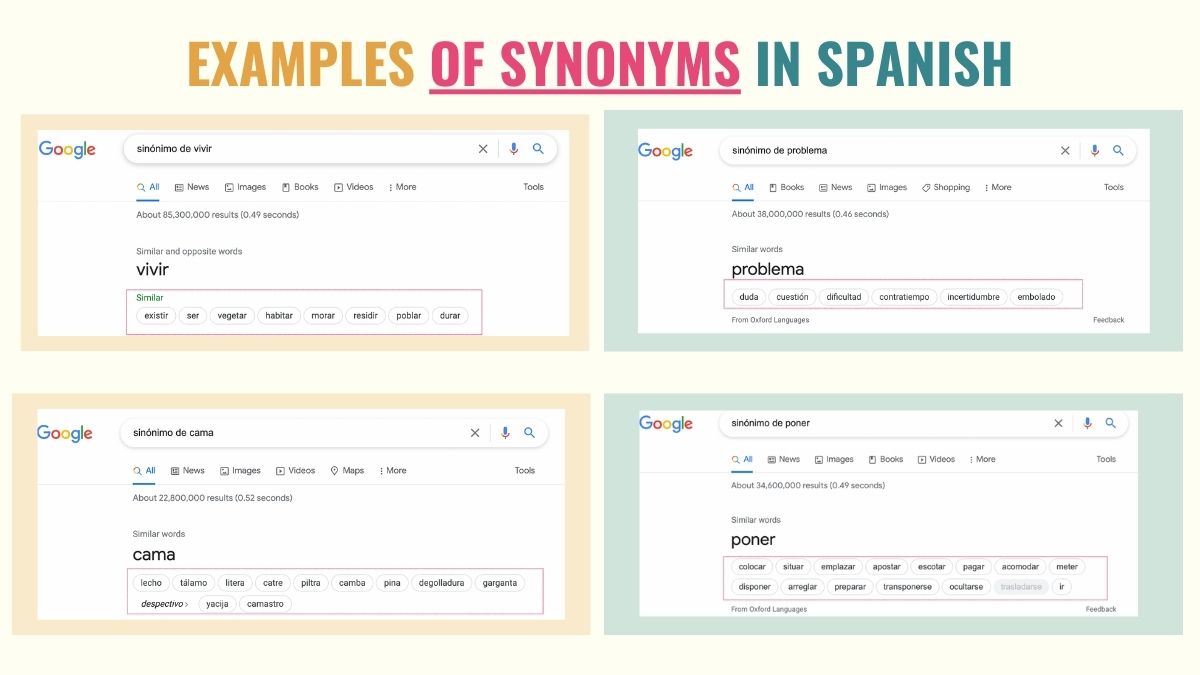Have you ever learned a new word in Spanish only to find out that native speakers use a different term to refer to the same thing? That’s the power of Spanish synonyms! If you’re interested in achieving fluency and accuracy in Spanish, you need to hammer out synonyms.
Most Spanish words have approximately 3-5 synonyms:

Many people think that synonyms in Spanish are only helpful to expand their vocabulary. However, in some instances, choosing one word over another can affect the nuance of a sentence. Given that Spanish synonyms are crucial for accurate communication, in this article, you’ll find some resources to help you learn more synonyms.
The topics we’ll cover include:
- Synonyms in Spanish: Definition & Importance
- Resources to Expand Your Vocabulary in Spanish
- Tips to Learn Synonyms & Antonyms
What Are Synonyms in Spanish?
According to the Royal Spanish Academy, a synonym is a word that shares the same or a similar meaning with another term. Although they’re very close in meaning, Spanish synonyms do not always share the same connotation.
In simple terms, this means that not all synonyms can be interchangeable unless accuracy is not an essential factor. Confused? Check these examples:
Quiero beber una limonada.
I want to drink lemonade.
Cece quiere tomar una limonada.
Cece wants to drink lemonade.
Eduardo vive en una casa muy grande.
Eduardo lives in a huge house.
Eduardo vive en una residencia muy grande.
Eduardo lives in a big residence.
Mi asiento está sucio.
My seat is dirty.
La silla está sucia.
The seat is dirty.
In Spanish, casa and residencia are synonyms. However, there’s a slight nuance in meaning between these words. ‘Residencia’ refers to a big, luxurious house, while ‘casa’ refers to an average house.
The same happens with examples #5 and #6. Silla usually refers to furniture that we find in a house or building. Asiento, on the other hand, refers to the seats you find in a vehicle, at a theater or sports arena. Unlike these examples, tomar and beber are actually interchangeable synonyms, so using one word or the other is a personal preference.
As you can see from the examples above, synonyms can have slightly different meanings that are only applicable to specific situations. To put it simply, learning Spanish synonyms is crucial because they allow you to communicate with other people more effectively and accurately.
Additionally, learning interchangeable synonyms will enrich your vocabulary and help you sound less repetitive when speaking Spanish.
Get a Step-by-Step Map to Learning Spanish
Join the Tell Me In Spanish community and get a copy of my step-by-step Spanish Learner’s Roadmaps and tricky synonyms & vocab cheat sheets.
Resources to Expand Your Vocabulary in Spanish
Now that you understand the importance of synonyms when learning Spanish vocabulary, it’s time to explore some useful resources. Below, you’ll find a list of articles that are meant to:
- Teach popular ways to say the same thing.
- Explain to you the nuances between multiple terms.
- Provide you with basic vocabulary and their synonyms.
Take Note: As you go through these articles, you’ll notice that some synonyms are more suitable for casual situations. Make sure you understand when it is more appropriate to use one term over the other.
Basic vocabulary + synonyms
- Bedroom Vocabulary in Spanish
- Essential Spanish Bathroom Vocabulary
- Kitchen Vocabulary Guide
- Linda vs. Bonita vs. Hermosa
- Living Room Vocabulary in Spanish
- Spanish Household Vocabulary
- Spanish Vocabulary for Dining Room
- ‘Te quiero’ vs. ‘Te amo’
Different words and expressions to call people and things in Spanish
- 5 Funny Words to Say ‘Sister’ in Spanish
- 6 Common Words to Say ‘Son’ in Spanish
- 7 Popular Ways to Say ‘Cat’
- 8 Ways to Say ‘My Love’
- 9 Terms to Call Your In-Laws in Spanish
- 9 Ways to Say ‘Dad’
- 9 Ways to Say ‘Dude’
- 9 Words to Say ‘Grandma’ in Spanish
- 10 Ways to Say Silly & Dumb in Spanish
- 10 Popular Terms to Say ‘Grandpa’
- 11 Funny Ways to Say ‘Dog’
- 11 Words for ‘Daughter’ in Spanish
- 11 Words to Say ‘Girlfriend’ in Spanish
- 12 Different Slang & Standard Ways to Say ‘Boy’ in Spanish
- 13 Ways to Say ‘Mom’
- 15 Ways to Call a Guy ‘Handsome’ in Spanish
- 17 Ways to Call a Girl ‘Beautiful’ in Spanish
- Nicknames for Tall Guys in Spanish
Different ways to express feelings, states and common phrases
- 6 Ways to Say “I’m Hungry” in Spanish
- 6 Ways to Say ‘Oh My God’ in Spanish
- 7 Slang Words to Say ‘Yes’
- 7 Spanish Phrases to Say ‘No Problem’
- 7 Popular Ways to Answer to ‘¿Cómo Estás?’
- 7 Ways to Say ‘Hurry Up’ Like a Native Speaker
- 7 Ways to Say ‘I Miss You’ in Spanish
- 9 Expressions to Say ‘Calm Down’ in Spanish
- 11 Expressions to Say ‘I don’t care’ in Spanish
- 11 Phrases to Say ‘I love You’
- 12 Ways to Say ‘Thank You’
- Common Ways to Say “I don’t Understand”
- Popular Ways to Ask for a Kiss in Spanish
- Popular Ways to say “You’re Welcome”
Synonyms for Spanish greetings, holidays and congratulations
- 5 Common Ways to Say ‘Nice to Meet You’
- Popular Phrases to Say ‘Good Morning’ in Spanish
- 5 Ways To Wish Someone a Happy New Year in Spanish
- 6 Popular Expressions to Say ‘Merry Christmas’
- 9 Ways to Say ‘Hello’
- 11 Practical Ways to ‘Ask How Are You’ in Spanish
- 13 Ways to Say ‘Goodbye’ in Spanish
How Can I Learn Spanish Synonyms & Antonyms?
If you’re wondering what’s the best way to expand your vocabulary with Spanish synonyms, here are some tips you can follow:
- Understand the connotation of a word: to master the synonyms you learn, you must understand the meaning and the contexts where a given word can be applied. So, when learning a new word, look for examples that show you how the new term is being used.
- Use dictionaries: the best place to look for synonyms is a dictionary. Since you’re going to receive different options, you may want to focus on synonyms that are frequently used in Spanish.
- Learn opposite terms: one of the easiest ways to increase your vocabulary is to learn antonyms. Simply put, when learning a new term, you also want to learn their opposite (bajar ≠ subir; dormirse ≠ despertarse; ir ≠ volver).
- Write examples with the new term: practice is key when learning new vocabulary. For that reason, you should make your own examples every time you learn a new word. Doing this will help you understand and reinforce how the term is being used.
- Expose yourself to Spanish: if you want to learn synonyms from the horse’s mouth, try to expose yourself to different sources of Spanish. For example, you can watch a TV show in Spanish and then the news. Both programs are likely to use basic Spanish, but since one is more formal than the other, you’ll be able to learn synonyms for different situations.

